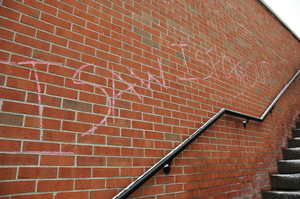A proposal by the Student Government Association passed April 24 seeks to give student organizations another vehicle of communication through chalking.

Freshman Luke Elmers, SGA senator for the Roy H. Park School of Communications, drafted the proposal in an attempt to reduce vandalism and increase student organization-based advertising on campus.
“We really wanted to be able to open the possibilities as far as communicating with students, as well as fostering a better sense of community on campus,” Elmers said.
The proposal is set to be reviewed by the SGA’s Solicitation Policy Committee before the end of the semester. It will either be approved or appealed to another review committee.
If passed, the proposal will allow registered student organizations to chalk on the blacktop surfaces of the Academic and Campus Center quads. The chalked messages will be allowed on display for up to two weeks and must adhere to the rules of Ithaca College’s Advertising and Solicitation policy.
Currently, chalking is not a recognized form of advertising on campus, Elmers said.
In 2003, a similar proposal for chalking was rejected on the grounds of being environmentally unfriendly, a burden on the Physical Plant and a blemish on the campus’s aesthetic beauty, according to the Solicitation Policy Committee’s 2003 memo.
In response, the new proposal recommends using water-soluble, biodegradable chalk that will have virtually no impact on the environment. The proposal also designates locations for chalking, and introduces the possibility of penalties for groups that fail to clean their chalking from the sidewalks.
Elmers said specific consequences have not been outlined, but may include group fines.
“We’re planning to let it go for a semester and if there turns out to be major problems or the administration doesn’t like it, we can look to other methods,” Elmers said.
Brian McAree, vice president of Student Affairs and Campus Life, said the policy against chalking is in place to curb over-advertisement and to preserve the campus’s natural beauty.
“It’s been an effort over the years on the part of the solicitation committee to try to reduce advertising every place you turn on campus,” McAree said. “If we were more flexible, you could have posters all over every door and tree on campus.”
Investigator Tom Dunn said the Office of Public Safety considers chalking graffiti, which is typically an ongoing problem for the campus.
“It’s not necessarily on the increase or decrease,” he said. “Our student population is transitional, so if anything it stays consistent.”
Dunn said people whom Public Safety finds responsible for chalking will be judicially referred if the chalking is done to school property. While chalk is less damaging than other forms of graffiti, like spray paint, and can easily be removed, Dunn said if chalking is found on a student’s personal property, the victim has the right to have the chalker arrested.
Matt Portman, public relations director for CannibalPotluck.com, a Web site whose chalk advertisements appeared on campus this week, said chalking should not be limited on campus.
“We pay to go here, so we should be able to chalk wherever we want,” he said. “It would reduce the amount of paper used for fliers and Mother Nature cleans it up. Chalking is no worse aesthetically than bulletin boards covered with fliers.”
Sophomore Kim Nesta, a member of Students for a Just Peace, said having a chalking policy would allow clubs to communicate more easily to the campus community.
“More people will see chalking advertisements walking to class than they will on paper on a bulletin board,” Nesta said. “I would definitely start chalking events for my groups. I think it would bring out more students.”
McAree said if the college passes the proposal it will serve as a test, applying the policy based on how the students cooperate.
“If the college decides to implement [the chalking proposal], it’s going to be something we’ll have to take a wait-and-see approach to, then evaluate,” McAree said.







